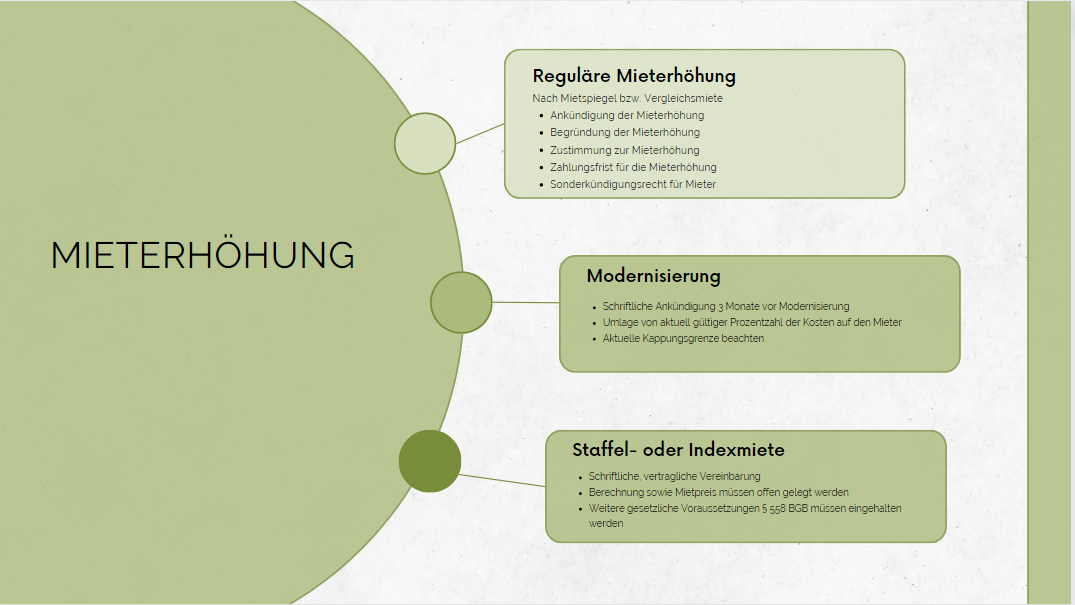Regional Court of Heidelberg, 17 February 2012, Ref.: 5 S 95/11
The legal requirements for a rent increase are regulated in Sections 558 to 560 BGB.
By far the most common form of rent increase is a rent increase up to the standard local comparative rent in accordance with Section 558 BGB. The landlord cannot unilaterally demand rent increases in accordance with Section 558 BGB, but must obtain the tenants' consent.
Tenants can refuse this consent if the requirements set out in §§ 558 ff. BGB are not complied with in the request for a rent increase.
The following requirements must always be met:
-
-
- Blocking period: In accordance with Section 558 (1) sentence 2 BGB, the request for a rent increase can be asserted at the earliest one year after the last rent increase.
- Local comparative rent: Pursuant to Section 558 (1) sentence 1 BGB, the landlord can only demand consent to a rent increase up to the customary local comparative rent.
- Cap: According to Section 558 (3) BGB, the rent may not increase by more than 20% within three years.
- Form and justification: According to § 558a BGB, certain formal and justification requirements must be met.
-
Depending on the case, however, there may be other requirements.
In the above-mentioned case, the Regional Court of Heidelberg had to decide whether a request for a rent increase was invalid due to a lack of justification because it referred to a rent index that was not applicable locally and objectively.
Facts of the Case:
Plaintiffs had rented semi-detached house to defendant
The plaintiffs were landlords of a semi-detached house occupied by the defendants. The rental property was located in the town of E., which bordered on the urban district of H. - W.. There was no rent index for the town of E., whereas there was a qualified rent index for the town of H.
As part of a request to increase the monthly net rent from EUR 1,000 to EUR 1,190, the plaintiffs referred to the rent index for H.
Tenants refused to agree to rent increase - local court rejects claim
The defendants refused the plaintiffs' consent on the grounds that the city of E. was not comparable to the city of H.
The district court initially seised dismissed the action. Referring to his many years of experience as a citizen of E. and listing various serious disadvantages of W. compared to E., the division judge stated that the places of residence were not comparable for the purposes of the rent increase.
Judgement of the Regional Court of Heidelberg
The Regional Court of Heidelberg also followed the view of the defendants. In this respect, the defendants were not obliged to agree to the requested amendment to the rental agreement.
Rent increase request did not fulfil the legal requirements
The plaintiffs were not entitled to consent to the rent increase because their request for a rent increase did not fulfil the legal requirements and was therefore invalid.
According to § 558a para. 2 no. 1, para. 4 sentence 2 BGB, reference to the rent index of the city of H should not be made to justify the request, because H. and E. would have to be comparable municipalities, which is obviously not the case.
Landlords had referred to the wrong rent index
According to Section 558a (1) BGB, the request for a rent increase would have to be justified in order to be effective. Section 558a (2) no. 1 BGB allows reference to be made to a rent index as justification.
According to paragraph 4 sentence 2 of this provision, if at the time the landlord makes his declaration there is no rent index that complies with section 558c (3) or section 558d (2), another, in particular an outdated rent index or a rent index of a comparable municipality, may also be used.
Communities were simply not comparable
In addition to the wording, it is also recognised in particular that a different rent index can be used even more so if there is no rent index at all in the municipality in which the rental property is located (Börstinghaus in Schmidt-Futterer, Mietrecht, 10th edition 2011, Section 558a marginal number 41).
Irrespective of the wording "in particular", this provision cannot be understood to mean that the other rent index may also be that of a non-comparable municipality. This is because the explicit naming of the comparable municipality would then be meaningless.

Source: Heidelberg Regional Court
Important Note: The content of this article has been prepared to the best of our knowledge and belief. However, due to the complexity and constant evolution of the subject matter, we must exclude liability and warranty. Important Notice: The content of this article has been created to the best of our knowledge and understanding. However, due to the complexity and constant changes in the subject matter, we must exclude any liability and warranty.
If you need legal advice, feel free to call us at 0221 – 80187670 or email us at info@mth-partner.de.
Lawyers in Cologne provide advice and representation in tenancy law.

